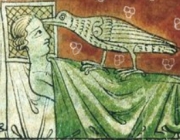|
If I remember right the cached supplies/base from his North Pole expedition play a major role in In the Land of White Death, but his Dukeness never shows up. I'm in the process of tracking down seal meat for my wedding dinner. Will let thread know thoughts on pinniped protein.
|
|
|
|

|
| # ? Apr 16, 2024 20:23 |
|
pookel posted:OK, Amazon lists one: The Duke of Abruzzi: An Explorer's Life Ditto. Ed Viesturs talks about the Duke and his expedition extensively in K2: Life and Death on the World's Most Dangerous Mountain (an excellent read about K2 and 8Kers). I will add that Cold: Exteme Adventures at the Lowest Temperatures on Earth (Ranulph Fiennes) is a great read on his explorations as well as an interesting discussion and perspective on most of the historical figures in polar expeditions. Free Market Mambo posted:I'm in the process of tracking down seal meat for my wedding dinner. Will let thread know thoughts on pinniped protein. Just don't feed them the liver! "Nutritional Fact Sheet posted:Inuit women of child-bearing age in Nunavut who may become pregnant, are planning to get pregnant, or are pregnant are advised to eat ringed seal meat instead of ringed seal liver (That document is hilarious).  Why, polar bear meat cooked in polar bear fat does sound good.  Blitter fucked around with this message at 04:39 on May 18, 2015 |
|
|
|
An excellent film (60 min, not 90 min as it says on the timer) on the Greeley arctic expedition of 1884, as good as you would expect of PBS. A bit of advice - don't look it up before you watch the film if you don't know about it. It is a real nailbiter! https://www.youtube.com/watch?v=UYzr2ddnW9Y Josef K. Sourdust fucked around with this message at 22:14 on Jun 25, 2015 |
|
|
|
I'll take scurvy for 400, Alex.
|
|
|
|
5 November: publication of the first book on the discovered wreck of HMS Erebus, by Geiger who wrote Frozen in Time. Might be a little early to write an analysis based on marginally over one season of diving but should be fascinating... http://www.amazon.co.uk/dp/0008151407/ref=sr_1_2?ie=UTF8&qid=1441621649&sr=8-2&keywords=geiger+franklin
|
|
|
|
Here's an upcoming SF book that's on my radar. Thought it might be a little bit relevant to this thread. https://www.orionbooks.co.uk/Books/detail.page?isbn=9780575127746 The Thing Itself by Adam Roberts (Dec 17) quote:Adam Roberts turns his attention to answering the Fermi Paradox with a taut and claustrophobic tale that echoes John Carpenters' The Thing.
|
|
|
|
Thanks to Nckdictator who posted this text on the PYF Unnerving Article thread: For some it is the wind; for some, the terrible cold. For others, it is the endless, howling blankness of the landscape that drains resolve, or the blinding glare of sun on fresh-laid snow, or the week-long blizzards that pin intruders inside tents that groan under the weight of drifts of snow. Not even the strongest, fittest, hardiest groups– intensively trained, exhaustively equipped and painstakingly acclimatized–can be certain of escaping with their lives from a journey through the hostile wilderness of Antarctica. Even today, with advanced foods, and radios, and insulated clothing, a journey on foot across these freezing wastes is the harshest of all tests that a human being can be asked to endure. A hundred years ago, it was far, far worse. Then, wool clothing absorbed snow and damp. High energy food came in an unappetizing mix of rendered fats called pemmican. Worst of all, extremes of cold pervaded everything; Apsley Cherry-Garrard, who sailed with Captain Scott’s doomed South Pole expedition of 1910-13, recalled that all his teeth, “the nerves of which had been killed, split to pieces” in temperatures that plunged as low as -77 degrees Fahrenheit. Cherry-Garrard survived to write an account of his adventures, a book he called The Worst Journey in the World. But even his appalling Antarctic trek–made in total darkness in the depths of the Southern winter–was not quite so horrifying as the desperate journey faced one year later by the Australian explorer Douglas Mawson, an epic that has gone down in the annals of polar exploration as perhaps the most terrible ever undertaken in Antarctica. In 1912, when he set sail across the Southern Ocean, Mawson was 30 years old and already acclaimed as one of the best geologists of his generation. Born in Yorkshire England, but happily settled in Australia, he had turned down the chance to join Scott’s doomed expedition in favor of leading the Australasian Antarctic Expedition, whose chief purpose was to explore and map some of the most remote fastnesses of the white continent. In almost every respect, Mawson was the ideal leader of a polar expedition. Tall, lean, balding, earnest and determined, he was an Antarctic veteran, a supreme organizer, and also physically tough. If any man was capable of achieving the expedition’s ambitious goals, it was him. The Australasian party anchored in Commonwealth Bay, an especially remote part of the Antarctic coast, in January 1912. Over the next few months this desolate region, hitherto unexplored, proved to be almost entirely unwelcoming. Wind speeds on the coast averaged 50mph and sometimes topped 200, and the area was swept by constant blizzards. Mawson’s plan was to split his expedition into four groups – one to man base camp and the other three to head into the interior to do scientific work. He nominated himself to lead what was known as the Far Eastern Shore Party–a three-man team assigned to survey a vast frozen sea where the conditions were particularly dangerous. It was an especially risky assignment. Not only would Mawson and his men have the furthest to travel, and hence the heaviest loads to carry; they would also have to cross an area pitted with deep crevasses, each concealed by a thin layer of snow. Put too much weight on too small an area of any of those flimsy bridges and it would collapse, plunging an explorer, dogs and sled into an apparently bottomless void. Dawson selected two companions to join him on his trek. The first was Lieutenant Belgrave Ninnis, a British army officer selected as the expedition’s dog handler. The other was Ninnis’s close friend, Xavier Mertz. Mertz was a 28-year-old Swiss lawyer whose chief qualifications for the trek were his idiosyncratic English–a source of great amusement to the other two – his constant high spirits and, not least, his standing as a champion cross-country skier. The explorers took with them three sledges, pulled by a total of sixteen huskies and loaded with a combined 1,720lbs of food, survival gear and scientific instruments. Mawson limited each man to a minimum of personal possessions. Nennis chose a volume of Thackeray, Mertz a collection of Sherlock Holmes short stories. Mawson’s own choice fell on his diary and a photograph of his fiancée–an upper class Australian girl named Francisca Delprait, but known to all as Paquita. At first Dawson’s party made good time. The three men rested for the first night at Aladdin’s Cave, a supply depot that established in a large snow-hole hacked out of the ice five miles from base. From there, they headed east into a rising wind. Just 25 miles from base, however, the onrushing blizzard enveloped them, and Mawson, Ninnis and Mertz spent the next five days crammed together in their only tent, half-buried in snow and unable to move in the face of the gale. The dogs remained outside, huddled together in the lee of the shelter, visible only as small, furry mounds amidst the drifts of snow. As the gale died down, the party set out again. They crossed a pair of vast glaciers, crumpled into a series of vast waves with peaks 250 feet high, and Mawson named them for his two companions. By December 13, the party was 300 miles out from Commonwealth Bay. Almost everything was going according to plan; the three men reduced their load as they ate their way through their supplies, and only a couple of sick dogs had hindered their progress. The distressed huskies were unharnessed and allowed to run alongside their companions until they recovered or died, but any animal that became too weak to pull again had to be killed. Even so, Mawson felt troubled by a series of peculiar incidents which–he would write later–might have suggested to a superstitious man that something was badly amiss with the Far Eastern Sledge Party. First he experienced a strange dream one night, a vision of his father. Mawson had left his parents in good health, but the strange dream occurred, he would later realize, shortly after his father had unexpectedly sickened and died. Then the explorers found one husky bitch, which had been pregnant, hungrily devouring her own litter of puppies. This was normal behavior for dogs in such extreme conditions, but it unsettled them–doubly so when, far inland and out of nowhere, a petrel suddenly appeared and smashed into the side of Ninnis’s sledge. ‘Where could it have come from?’ a baffled Mertz scribbled in his notebook. Then there were the crevasses–hidden, treacherous, and all too easy to blunder into. A whole series of near-disasters made the party begin to feel that their luck must be running out; three times Ninnis broke through the thin crust that concealed a dangerous crack in the ice and only just managed to grab at the runners of his sled as he plunged into the abyss. To make matters worse, all three men were beginning to feel the effects of privation. Mawson was suffering from a split lip that sent shafts of pain shooting across the left side of his face. Ninnis experienced a bout of snow-blindness and then developed an agonising abcess at the tip of one finger. When the pain became too much for him to bear, Mawson was forced to lance it with a pocket knife but without benefit of anesthetic. On the evening of December 13, 1912, the three men pitched camp in the middle of yet another glacier. Mawson abandoned one of their three sledges their and redistributed the load on the two others. Then the men slept fitfully, disturbed by the distant sounds of booms and cracking deep below them. Mawson and Ninnis did not know what to make of the noise, but it frightened Mertz, the Swiss, whose long experience of snowfields taught him that warmer air had made the ground ahead of them unstable. “The snow masses must have been collapsing their arches,” he wrote. “The sound was like the distant thunder of cannon.” Next day dawned sunny and warm by Antarctic standards, just 11 degrees below freezing. The party continued to make good time and at noon Mawson halted briefly to shoot the sun in order to determine their position. He was standing on the runners of his sledge, letting the dogs do the work while he completed his calculations, when he became aware that Mertz, who was ski-ing ahead of the sledges, had stopped singing his Swiss student songs and was raising one ski stick in the air. This was the signal that he had encountered a crevisse, and Mawson called back a warning to Ninnis. Then, considering that the crevisse “had no specially dangerous features,” he returned to his workings. It was only several minutes later that he noticed that Mertz had halted again and was looking back in alarm. Turning, Mawson saw only an empty landscape. Ninnis and his sledge and dogs had vanished. Mawson and Mertz hurried back a quarter of a mile to the spot where they had crossed the crevasse, praying that their companion had been lost to view behind a rise in the ground. It was a forlorn hope; when they reached the spot where Mertz had raised his ski-stick, they discovered a yawning chasm had opened in the snow, leaving a gap 11 feet across. Crawling forward on his stomach and peering into the void, Mawson dimly made out a narrow ledge more than a hundred feet below him. Two dogs could be seen lying on it: one dead, the other lying writhing with a broken back. Below the ledge, the sheer ice walls of the crevasse plunged down into impenetrable darkness. Frantically, Mawson called Ninnis’s name, again and again. Nothing came back but the echo. Using a knotted fishing line, he sounded the depth to the ice ledge, and found it to be 150 feet, much too far to climb down to. For more than five hours, he and Mertz took turns to call for their companion, hoping against hope that he had merely been stunned. “He must have struck [the ledge] & been killed instantly, then gone on down,” Mawson would write in his diary. That still left the mystery of why Ninnis had plunged into a crevasse that he and Mertz had crossed safely. Mawson concluded that the dead man’s fatal error had been to run alongside his sledge rather than stand astride its runners as he had done. With his whole weight pressing down on just a few square inches of snow, Ninnis had exceeded the load that the flimsy crevasse lid would bear, with fatal results. The fault, though, was Mawson’s; as leader, he could have insisted on skis, or at least snowshoes, for his men. Mawson and Mertz read the burial service at the lip of the void and paused to take stock of their situation. It was clearly desperate. The party had taken care to split their supplies between the two remaining sledges, but Mawson had assumed that the lead sled was far more likely to encounter difficulties than the one at the rear. For that reason, Ninnis’s sledge had been loaded with most of their food supplies and their tent. “Reviewed our situation,” Mawson wrote. "Practically all the food had gone–spade, pick, tent. Mertz’s Burberry trousers & helmet, cups, spoons, mast, sail etc. We had our sleeping bags, a week and a half food, the spare tent without poles, & our private bags & cooker and kerosene. The dogs in my team were very poorly and the worst [of the 16], & no feed for them–the other team comprised the picked dogs… We considered it a possibility to get through to Winter Quarters [however] by eating dogs, so 9 hours after the accident started back, but terribly handicapped. May God help us." The first stage of the return journey was a “mad dash,” Mawson noted, to the spot where they had camped the previous night. There, he and Mertz recovered the sledge they had abandoned before it could be covered by fresh falls of snow. Painstakingly, using only a pocket knife, Mawson hacked its runners to pieces to improvise poles for their spare tent. Now they had shelter again, but there was still the matter of deciding how to attempt the return journey. The party had left no food depots on their way out, and his left them with the choice of heading for the sea–a greater distance but a route that offered the chance of seals to eat and the outside chance that they might sight the expedition’s supply ship–or making a fast return over the glaciers the way they had come. Worried about the fast-dwindling supply of food, Mawson selected the latter course. He and Mertz killed the weakest of their remaining dogs, ate what they could of its stringy flesh and liver, and fed what was left of the carcass to the other huskies. They improvised as they went, crafting spoons out of bits of broken sledge and plates from empty tins, and for the first few days made good time. Soon, though, a bout of snow-blindness slowed Mawson down. The pain was agonizing, and though Mertz bathed his leader’s eyes with a solution of zinc sulphate and cocaine, the pair had to slow down. Then they marched into a whiteout, seeing “nothing but greyness,” Mertz scribbled in his notebook, and the huskies Mary and Ginger collapsed. The men were forced to harness themselves to the sled in order to continue. Learning by experiment, Mawson found that "it was worth the while spending some time in boiling the dogs’ meat thoroughly. Thus a tasty soup was prepared as well as a supply of edible meat in which the muscular tissue and the gristle were reduced to the consistency of a jelly. The paws took longest of all to cook, but, treated to lengthy stewing, they became quite digestible… Had a great breakfast off Ginger’s skull–thyroids and brains." Even so, the two men’s physical condition rapidly deteriorated. By the time they reached the Ninnis Glacier, still 160 miles from base, it was necessary to abandon much of the scientific equipment that Mawson had hoped to save. Mertz was in an especially bad way; the loss of his waterproof Burberry meant his clothing was constantly chill and wet. By January 5, Mawson could write in his diary: “He is generally in a very bad condition… skin coming off legs, etc.” Despite Mawson’s desperation to keep moving, Mertz insisted that a day’s rest might revive him, and the pair spent 24 hours in their sleeping bags. Mawson became increasingly concerned at his companion’s mental state; Mertz seemed to be losing heart, and would not consent even to resting on the sledge so that they could continue to make progress. “I think he has a fever, he does not assimilate his food,” Mawson wrote on January 6. “Things are in a most serious state for both of us–in he cannot go 8 or 10 m[iles] a day, in a day or two we are doomed. I could pull through myself with the provisions at hand but I cannot leave him. His heart seems to have gone. It is very hard for me–to be within 100 m[iles] of the Hut and in such a position is awful… Both our chances are going now.” Weakly, Mertz agreed to go on, but next morning Mawson awoke to find his companion delirious; worse, he had developed diarrhea and fouled himself inside his sleeping bag. It took Mawson several hours to clean Mertz up and put him back inside his sleeping bag to warm up. But then, he added, just a few minutes later, " I find him in a kind of fit & wrap him back up in the back… This is terrible. I don’t mind for myself, but it is for Paquita and for all the others connected with the expedition that I feel so deeply and sinfully. I pray God to help us." Mertz took some cocoa and beef tea as they traveled, but the fits got worse and he fell into a delirium. Mawson made camp, and took out his diary again. “At 8pm he raves & breaks a tent pole..,. Continues to rave for hours. I hold him down, then he becomes more peaceful & I put him quietly in the bag. He dies peacefully at about 2am in the morning of 8th. Death due to exposure finally bringing on a fever, result of weather exposure & want of food. He had lost all skin of legs and private parts. I am in the same condition & sores on fingers won’t heal.” The expedition’s leader was now utterly alone and badly weakened: “The nose and lips break open also–my scrotum, like Xavier’s, is getting in a painfully raw condition due to reduced condition, dampness and friction in walking. It is well nigh impossible to treat.” Worse, Mawson was still at least 100 miles from the nearest human being, and readily admitted later that he felt “utterly overwhelmed by an urge to give in”–to lie in the warmth of his sleeping bag and consume the remaining supply of food before allowing the white continent to envelop him. In the end, it was determination to survive for Paquita, and to give an account of his two dead friends, that drove him on. At 9am on January 11 the wind finally died away. Mawson had passed the days since Mertz’s death productively. Using his now blunt knife, he had cut the one remaining sledge in two; he resewed his sail; and, incredibly, even found the strength to drag Mertz’s body out of the tent and entomb it beneath a cairn of ice blocks that he hacked out of the ground. Now he began to trudge towards the endless horizon, man-hauling his half sledge. Within a few miles, though, Mawson’s physical condition worsened drastically. His feet became so painful that each step was an agony; eventually he was forced to sit on his sledge and remove his socks and boots to investigate the pain. What he found was shocking: inside his socks, the soles of his feet had come completely away, leaving nothing but a raw mass of weeping blisters. Desperate, he smeared the soles with lanolin and bandaged the loose skin back to his feet and staggered on. That night, curled up in his makeshift tent, he wrote: "My whole body is apparently rotting from want of proper nourishment–frost-bitten fingertips, festerings, mucous membrane of nose gone, saliva glands of mouth refusing duty, skin coming off the whole body." Next day, Mawson’s feet were still too raw to walk, and he occupied his time redistributing his remaining supplies. Small things drove him to angry self-recrimination–he was nibbling supplies from several bags instead of consuming them one at a time, and could not make the load balance properly. On January 13 he marched again, dragging himself towards the Mertz Glacier, and by the end of that day he could at last see in the far distance the high uplands of the vast plateau that terminated at base camp. By now he could cover little more than five miles a day. Mawson’s greatest fear was that he, like Ninnis, would stumble into a crevasse as he crossed the glacier. In an attempt to make his journey slightly safer, he roped himself to the half-sledge, but, on January 17, the worst happened anyway. A snowbridge he was crossing collapsed under his weight, sending him plummeting downwards. Incredibly, however, the fissure that was opened was just a little narrower than the half-sledge. With a jerk that all but snapped his fragile body clean in two, Mawson found himself dangling 14 feet down in an apparently bottomless pit, spinning slowly on a finger thickness of frayed rope. He could sense "the sledge creeping to the mouth [of the crevasse]. I had time to say to myself, ‘So this is the end,’ expecting every moment the sledge to crash on my head and both of us to go to the bottom unseen below. Then I thought of the food left uneaten on the sledge, and… of Providence again giving me a chance. The chance looked very small as the rope had sawed into the overhanging lid, my finger ends all damaged, myself weak." Making a “great struggle,” Mawson inched up the rope, hand over hand. Several times he lost his grip, slipped back, and plummeted to the end of the rope again. Each time the rope held. Sensing that he had the strength for one final attempt, he clawed his way to the lip of the crevasse, every muscle spasming, his raw fingers slippery with blood. “At last I just did it,” he recalled, and dragged himself clear, only to collapse, utterly exhausted, and for an hour he lay by the edge of the chasm. It was only in the early afternoon that he recovered sufficiently to drag open his packs, erect the tent, and crawl into his bag to sleep. Again he had to resist the temptation to give in, to eat what was left of his food supplies and enjoy a last few days of life rather than force himself on in agony. Again he resolved to continue. Mawson recognized how close he had come to death and that night, lying in his tent, he fashioned a rope ladder whiuch he anchored to his sledge. The loose end he attached to his harness. Now, if he was to fall again, getting out of a crevasse ought to be easier. The theory was put to the test the following day, when the ladder saved him from another dark plummet into ice. Towards the end of January, Mawson found himself reduced to four miles of marching a day; his remaining energies were sapped by the need to endlessly dress and redress his many injuries. His hair began to fall out and he found himself pinned down by another blizzard. Desperate, he forced himself to march eight miles into the teeth of the gale and struggled for two moor to erect his tent. Next morning, the forced march seemed worth it. Mawson emerged from the tent into bright sunshine–better, to the sight of the coastline of Commonwealth Bay. He was only 40 miles from base, and little more than 30 from Aladdin’s Cave and its cache of supplies. Not the least staggering of Mawson’s achievements on his solo trip was the pinpoint precision of his navigation. On January 29, marching through another gale, he spotted a low cairn a mere 300 yards off the path of his march. It proved to mark a cache of food and a note left by his worried companions at base camp. Emboldened, he pressed on at a faster pace, and on February 1 reached the entrance to Aladdin’s Cave, where he wept to discover three oranges and a pineapple–overcome, he later said, by the sight of something that was not white. As he rested that night, the weather closed in again, and for five days Mawson was confined to his snow hole as one of the most vicious blizzards he had ever known raged over him. Leaving as the storm dropped on February 8, he found his way to base just in time to see the expedition ship, Aurora, leaving for Australia. A shore party had been left to wait for him, but it was too late for the ship to turn, and Mawson was forced to spend a second winter in Antarctica. In time, he would come to view this as a blessing; the gentle pace of life, and the solicitude of his companions, was what was needed if he was to recover from the rigours of his trek. There remains the puzzle of the mysterious illness that claimed Mertz’s life and nearly took Mawson’s. Some polar experts are convinced that it was caused by nothing more remarkable than poor diet and exhaustion, but there is another possibility. Doctors have suggested that the true cause of the malaise was actually husky meat–specifically, the dogs’ vitamin-enriched livers, each of which contains such high concentrations of Vitamin A that it can bring on a condition known as “hypervitaminosis A.” This causes drying and fissuring of the skin, hair loss, nausea and, in high doses, madness–precisely the symptoms displayed by the luckless Xavier Mertz.
|
|
|
|
This thread has provided me with at least a quarter of my 2015 reading list. I never knew it could be so fascinating reading about men of questionable sanity more or less literally freezing their balls off while exploring the most hostile continents and conditions on Earth. One of the books I recently finished was In The Kingdom of Ice by Hampton Sides. I thought it was an enjoyable read but especially in the beginning it suffered from what I felt to be unnecessary tangents; there's a lot of information on characters that then barely figure in the narrative. I did like that Sides elaborated on the (lack of) scientific understanding of the North Pole at that time and once the USS Jeannette is sunk and the party makes their way across the ice and later the Lena Delta the book really gets going. Does anyone have any good suggestions for reading about the Greely expedition? Because that really sounds like something else.
|
|
|
|
Somehow before I read Kingdom of Ice, I had the idea in my head that they all died on the boat and never made landfall. No idea why I thought that, but I was totally sure about it. Even told people who asked me what I was reading "It's about one of the first naval expeditions to the Arctic, but the explorers don't make it to land." So once they actually landed, the book went from being about a tragic doom to this crazy race against the clock thriller to see if any of them lived to return home. It was a great reading experience.
|
|
|
|
Norrskensren posted:This thread has provided me with at least a quarter of my 2015 reading list. Thanks for the comment!  People don't really think of polar exploration literature as a genre since no one has done anything new in the regions for about 80 years but once it was front page news. All those stories of discovery, desperation, madness, heroism, cannibalism and amazing survival - and all of it true.... People don't really think of polar exploration literature as a genre since no one has done anything new in the regions for about 80 years but once it was front page news. All those stories of discovery, desperation, madness, heroism, cannibalism and amazing survival - and all of it true....Norrskensren posted:Does anyone have any good suggestions for reading about the Greely expedition? Because that really sounds like something else. No idea but if someone wants to suggest a title I'll add it to the OP.
|
|
|
|
I'm reading Douglas Mawson's Home of the Blizzard, an edition I picked up a few years ago complete with photos (taken by Frank Hurley who also was the photographer for Shackleton's Endurance expedition) and foreword by Ranulph Fiennes. I'm about half-way through, and it's a very good book. It's almost stereotypically "well the winds were 90 mph but we kept a stiff upper lip and a good time was had by all." There's a lot of stuff on day-to-day life of being in Antarctica, which I'm finding fascinating coming as a first-hand account instead of something distilled.
|
|
|
|
A distant relative of Frank Worsley, the captain of the Endurance died a few days ago trying to replicate Shackleton's ill-fated expedition.  quote:Explorer Henry Worsley dies attempting Antarctic crossing
|
|
|
|
Rondette posted:A distant relative of Frank Worsley, the captain of the Endurance died a few days ago trying to replicate Shackleton's ill-fated expedition. Kind of a British way to die - doing it the hard way and just failing.  Has anyone read the Geiger book on the wreck of Erebus? Any views?
|
|
|
|
Free Market Mambo posted:I'm in the process of tracking down seal meat for my wedding dinner. Will let thread know thoughts on pinniped protein. I can confirm that lingon and hjorton berries (cloudberries) are delicious. Wasn't the Amundsen speciality seal meat with cloudberries? Cloudberry would also go well with reindeer.
|
|
|
|
So far the only review I can find for the Geiger book about the wreck of Erebus is this one: http://reviewcanada.ca/magazine/2016/01/flotsam-jetsam/ While it gives the political context to the serach and discovery, it doesn't tell me anything about the discoveries themsleves. Does anyone know of other reviews? Has anyone read this book?
|
|
|
|
New(ish) PBS Nova documentary on the Franklin expedition and the search for the sunken ships. https://www.youtube.com/watch?v=vv_4VnrTC8g Don't be too put off by the fish-eye lens and thumping music, it settles down about 10 min in. Includes footage of the wreck of Erebus but nothing much in terms of new data. The rest of the program does not have much new but still worth watching.
|
|
|
|
What do you do with an arctic sailor... ear-ly in the morning 
|
|
|
|
Put him on the ice and hope he makes it. Give him raw seal and make he eats it. Put him in a box for later study. Give him lots of lead so that he drinks it.
|
|
|
|
Ear-ly in the endless twilight
|
|
|
|
Today's featured article on Wikipedia is the Jeannette Expedition: https://en.wikipedia.org/wiki/Jeannette_Expedition
|
|
|
|
Thanks to this thread I've been reading Dark Matter: A Ghost Story and it's really loving good and spooky.
|
|
|
|
Imagined posted:Thanks to this thread I've been reading Dark Matter: A Ghost Story and it's really loving good and spooky.
|
|
|
|
Josef K. Sourdust posted:Today's featured article on Wikipedia is the Jeannette Expedition: Great book on that is "In the Kingdom of Ice." The path of some of the Jeaneatte's wreckage on polar currents was instrumental in inspiring Fritdjof Nansen's Fram expedition.
|
|
|
|
I've seen people mentioning Dark Matter . But I'm greedy. Would like some recomendations on horror and fantasy/sci fi novels. Mostly icy horrors. I haven't read anything like this. Unless Dreamcatcher by Stephen King counts? The ice area is always my favorite. And I didn't know about the pagophile term, so thank you.
|
|
|
|
Have you read Dan Simmons's The Terror? It's got what you are looking for.
|
|
|
|
I just read Barry Lopez' Arctic Dreams: Imagination and Desire in a Northern Landscape, which subtitle conveniently summarises the book's main concerns, the relationship between the (mostly North American) Arctic and the human mind, both aboriginal and Western. Large parts of it are wrapped around his own experiences travelling in the Arctic, and overall the book traces an obvious course from the cosmology and geography that create the Arctic, to soil, trees, chapters on muskoxen, polar bears, and narwhals, then human arrival in the Arctic, Western exploration, and finally exploitation of the land for its natural resources. It's not totally linear, though; science, exploration, and psychology turn up wherever is relevant, and there's a long chapter about ice, light, and paintings. It's mostly about the landscape, what it means to people, how it affects them, how they see it, and how we should relate to it. Lopez writes about his own response to the landscape, or the reasons Westerners went there: for money, glory, or ecstatic spiritual response to the landscape; and how the native people relate meaningfully to the land in a way newcomers can't - there's a fascinating bit about how good they are at drawing and reading maps), how trapped sailors hated the darkness and waited for the sun to return, how the long summer sun makes it the most dignified place in the world, how mediaeval cathedrals were also made of light, expressing this mystical insight. Some of it's about explorers' motivations and what they saw when they arrived in the Arctic, from godforsaken deserts to self-sufficient hunting grounds. Some of it's about the psychology of people who live there, their patience and good humour, their ego-subverting connection to the land while hunting (this is a bit spoilt by relying on the Sapir-Whorf hypothesis, of all things.) Near the end there's a description of an oil drilling station, how miserable and spiritually empty it is, and how a mining company president visits a local village purely out of concern that an icebreaker might be affecting them. It's a great, thoughtful book. Not perfect. There aren't enough maps; the end of the exploration section is a bit of a letdown, as he runs out of steam; and his musings on linguistics and quantum theory are unconvincing. His spiritual and ecological concerns are beautiful and relevant, but in a conventional way. Overall it's a fascinating topic, difficult to handle and endlessly intriguing, and Lopez mostly measures up to it.
|
|
|
|
/\ /\ /\ /\ /\ /\ That is a great write up. I read the book a while back and entirely agree. For anyone who is interested in the ecology of the polar regions this book is a must-read.
|
|
|
|
HMS Terror has been found, for fans of The Terror or those interested in the Franklin expedition! https://www.theguardian.com/world/2016/sep/12/hms-terror-wreck-found-arctic-nearly-170-years-northwest-passage-attempt No mention of whether any invulnerable giant polar bears were seen nearby though
|
|
|
|
Found in Terror Bay. Who would have thought it? (Inuits, that's who) Looking forward to seeing some ROV footage, if it's in as good condition as they say.
|
|
|
|
drat! Beaten! You guys are good.  Here is the NPR report on this: Here is the NPR report on this:http://www.npr.org/sections/thetwo-way/2016/09/12/493676137/second-vessel-from-doomed-franklin-expedition-found-in-the-arctic E: Of course, the biggest find would be sealed brass communication tubes with a full written account of the disaster. Josef K. Sourdust fucked around with this message at 12:10 on Sep 13, 2016 |
|
|
|
For Antarctic fiction that I haven't seen mentioned, I just finished Everland by Rebecca Hunt ... I picked it up at a charity shop with no recommendation and really enjoyed it. It's two parallel stories, one set in 1913 and one set in 2012 of two expeditions that go to an island named Everland, in the Antarctic. Things go wrong and the stories begin to intertwine over the century gap, and it does have some genuinely creepy moments, as well as some nods to expeditions of the past from Scott to Mawson. I don't really want to spoil it too much, but if you're hankering after some realistic but not real Antarctic survival stories this'll do nicely.
|
|
|
|
/\/\/\/\/\/\/\/\ Sounds intriguing. I shall haunt the charity shops here. This thread has given me a few titles to check out. Yeah, on Fiennes, he's very very pro-Scott. I recently saw a doc on YouTube with an American scientist (Solomon?) who was saying that Scott got the worst winter in X years and that was what stopped him. I'll tell you what stopped me watching the documentary was the point where she said he approached the expedition like a science and had everything planned out in advance. Bollocks! He took untested machinery (the motor sleds), unproven horses (chosen according to coat colour, my! how scientific!) and didn't even learn to ski before arriving in the south. Remember how he planned to go the pole with four members in the party then a couple of days before the final party was selected upped the number to five entailing all o fthe rations and sleeping arrangements to be changed? The biggest problem with people whining about how Scott got bad weather and that is what finished him do not note that a) if he planned properly and travelled faster then he would never have been on the ice so late in the season and b) a "man of science" would not have relied on perhaps 4-6 years' of weather data to base an accurate forecast on. Grrrrrrr... sorry, don't get me started on this....
|
|
|
|
After following this thread for quite some time - thanks for the entertainment! - I have one request. Last year I've sailed to Norway on a brig named Roald Amundsen, to visit the Fram museum in Oslo, all while reading Amundsen's write-up of his antarctic journey. His book is very much a thing reflecting the contemporary Zeitgeist, too. What's the best English or German-languaged book about Scott's expedition? Footnote on the Fram museum: I was REALLY surprised on her having a wooden hull. It was quite fascinating how she was designed around arctic waters, though. Sturdy wooden struts, Iron bands nailed to the bow and aft and a mechanism to lift the rudder out of the water protected her from ice. Seeing a Diesel engine bolted to a wooden deck was quite a thing, too. The museum shows how Amundsen's Gjøa expedition prepared him well for his later antarctic expedition.
|
|
|
|
A great starting place for Amundsen is Roland Huntford's The Last Place on Earth, it was one of the first books (in English) to really begin to look beyond the British narrative of the Pole's discovery. There's even a BBC film of it with Max von Sydow as Nansen, it's flawed but fun. Cherry-Garrard's The Worst Journey in the World is very interesting to read before or after Huntford, it's written by an expedition member, and borders on hagiography at times (it ends with Garrard dismissing most criticisms of Scott) and glosses over almost all of the interpersonal conflicts that the expedition was marked by. Also, the Fram Museum is amazing, I spent about 5 hours there just pumped as all hell to be on the Fram, it was essentially like the ISS of the day. They really did a fantastic job of creating an accessible and enjoyable museum. I loved the "slice of life" film clips they made, particularly their sauna.
|
|
|
|
Free Market Mambo posted:
I'm dipping in and out of this, I love the chapter where they stop of at South Trinidad and get utterly creeped out by the masses of land crabs that live there. He also writes some lovely passages- quote:I have seen Fuji, the most dainty and graceful of all mountains; and also Kinchinjunga: only Michelangelo among men could have conceived such grandeur. But give me Erebus for my friend. Whoever made Erebus knew all the charm of horizontal lines, and the lines of Erebus are for the most part nearer the horizontal than the vertical. And so he is the most restful mountain in the world, and I was glad when I knew that our hut would lie at his feet. And always there floated from his crater the lazy banner of his cloud of steam. quote:Whatever a penguin does has individuality, and he lays bare his whole life for all to see. He cannot fly away. And because he is quaint in all that he does, but still more because he is fighting against bigger odds than any other bird, and fighting always with the most gallant pluck, he comes to be considered as something apart from the ordinary bird—sometimes solemn, sometimes humorous, enterprising, chivalrous, cheeky—and always (unless you are driving a dog-team) a welcome and, in some ways, an almost human friend.
|
|
|
|
Free Market Mambo posted:recommendations Totally agree. You'll need to read Huntford to know what the recent biographers are kicking against. As a Brit, I was totally shocked to discover the truth about Scott and Amundsen when for years we are fed the myth of Scott heroically sacrificing himself beaten by the darstardly Norwegian who ate his own dogs! But I would also recommend reading Scott's diaries as they are informative and he was a decent writer. Just a shame about being a crap leader. Rondette posted:Worst Journey in the World Worst Journey in The World is really great. The best moment is when their tent is ripped away by the wind and they face certain death...until they find the tent deposited right next to them. The horrors they endured were unimaginable. It was like volunteering to go to a Siberian gulag.
|
|
|
|
This exchange from Red Dwarf always makes me laugh...quote:Kryten: I beg you to reconsider, Sir. Human history is resplendent with examples of such sacrifice. Remember Captain Oates: "I'm going out for a walk. I may be some time."
|
|
|
|
Rondette posted:This exchange from Red Dwarf always makes me laugh...  RD always warms my heart. I was really pleased to see the series on Dave. I remember watching it as a kid and I've got a lot of affection for the characters. RD always warms my heart. I was really pleased to see the series on Dave. I remember watching it as a kid and I've got a lot of affection for the characters. Re Oates, it seems that he was given a large dose of morphine and that he survived and only the following evening did he leave the tent. Apparently the family of Oates destroyed his diaries....
|
|
|
|
Heads up for forthcoming books on the Franklin expedition. These will presumably include information about the newly discovered ships. The last book cashing in on the photos of the ships had apparently very little info. Let's hope these are better: https://www.amazon.co.uk/John-Frank...klin+expedition New edition of Geiger and Beattie's book with extra info: https://www.amazon.co.uk/Frozen-Tim...klin+expedition https://www.amazon.co.uk/Ice-Ghosts...klin+expedition This title covers item discovered before 2014. No doubt there will extra items on the ships. https://www.amazon.co.uk/Relics-Fra...klin+expedition
|
|
|
|

|
| # ? Apr 16, 2024 20:23 |
|
Rondette posted:This exchange from Red Dwarf always makes me laugh... I think the thing about Cherry-Garrard that makes him a great read, but not a 100% accurate source, is that you can tell how deeply he admired Scott and cared about his fellow expedition members. He doesn't want to speak ill of the dead, so he glosses over anything that makes them look bad. But he extends the same kindness to everyone, not just Scott - iirc, he was always respectful in writing about Amundsen's expedition as well.
|
|
|























